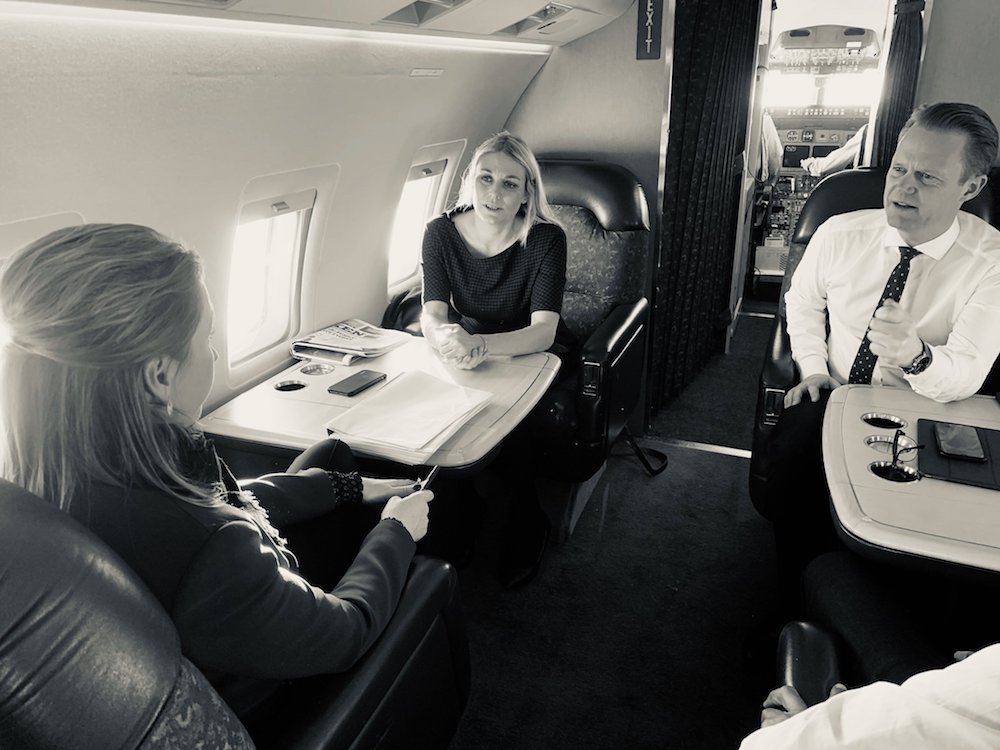Greenland is disappointed over its absence from US-Denmark ‘Arctic question’ discussion
Lawmakers from Greenland worry Copenhagen is making decisions first and telling Nuuk later.

When Danish Prime Minister Mette Frederiksen met with U.S. President Donald Trump on the sidelines of the NATO summit in London on Wednesday, she was accompanied by an entourage that included her foreign minister and her defense minister.
Not included in the group were representatives from Greenland or the Faroe Islands. In of itself, there is nothing problematic about this; NATO is a military alliance, and Copenhagen is ultimately responsible for defense issues for the entire kingdom of Denmark.
Nevertheless, lawmakers from Nuuk and Tórshavn are criticizing Frederiksen’s failure to invite Greenlandic and Faroese representatives to take part in the meeting.
“We know that the Arctic was discussed — which means Greenland was also discussed,” Aaja Chemnitz Larsen, one of Greenland’s two representatives in the Danish national assembly. “That was her bad. There’s got to be a better way to do it next time.”
Møde mellem statsminister Mette Frederiksen og den amerikanske præsident Donald Trump i London. Til stede var også @JeppeKofod og @Trinebramsen @DanishMFA @Forsvarsmin #dkpol pic.twitter.com/stjAfGtuGd
— Regeringen (@regeringDK) December 4, 2019
Larsen and other lawmakers from Greenland and the Faroe Islands cite long-standing agreements with Copenhagen that oblige it to include Nuuk and Tórshavn in discussions of foreign policy and defense topics that are relevant to them.
The agreements, for example, mean the Kingdom of Denmark is represented by one person from each of the three countries during Arctic Council meetings.
A statement from Greenland’s Self-Rule authority indicated that Frederiksen had told Greenlandic officials prior to her departure for London that she would announce that she was prepared to triple defense spending in Greenland.
Critics, however, argued that Copenhagen should have gone further.
“Since the money is going to be used in Greenland, it’s important that Greenland is told and that it is involved in how it happens,” Sermitsiaq, a Greenlandic weekly, wrote in its editorial. “We’re at a loss as to why Greenland was not invited to meeting about involving Greenland in an arms race in the Arctic.”
[Greenland’s first representative in Iceland is a man for all reasons]
Foreign policy specialists, and, indeed, some Greenland lawmakers, accepted that the set-up of a NATO summit made it impossible to accommodate a foreign policy troika of this sort. But the uncertainty has weakened some of the confidence that this was an arrangement Frederiksen’s government takes seriously, and which, in November, saw Ane Lone Bagger, Greenland’s foreign minister, invited to attend the first meeting between Jeppe Kofod, the Danish FM, and Mike Pompeo, the secretary of state. (In sticking with the letter of the agreement, Bagger was shown out of the room when talk turned to non-Arctic matters.)
Likewise, had Trump not cancelled his trip to Copenhagen this past September, he would have been able to discuss his idea suggested purchase of Greenland with Kim Kielsen, the country’s premier.
Frederiksen, after the London meeting, challenged the suggestion that she and Trump had discussed the Arctic or Greenland without a representative from Nuuk present.
“It was about the Arctic question,” she said.
[Greenland-Denmark relationship in “crisis” over issues surrounding 2 US bases]
She reassured Greenland and the Faroe Islands that the two countries would continue to be involved when issues involved them directly. The important thing, she underscored before departing for London, was that Copenhagen and Washington were beginning to pay more attention to the region.
“We’re contributing more resources, and I know that the U.S. is pleased with that.
Whether Greenland is too remains to be seen.